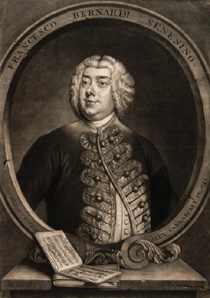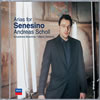 |
| home
site
map
contact |

This CD was Number 1 in the UK classical charts in its first week of release
and the only classical CD in the top 100 CDs of 2005 in the Observer Music Magazine (UK)
CD details here
If you own copyright in any material on this page and object to our using it, please mail us and we will remove it immediately.

Press reviews of the CD
| 1 - Gramophone: Editor's Choice |
| review by Richard Wigmore |
|
For
his colleagues, Handel included, Senesino ('the
Sienese') seems to have been the star castrato from hell: vain,
insufferably arrogant, likely to throw a tantrum at the slightest
provocation. But for three decades, he enraptured audiences in Italy
and London with the sheer beauty of his voice ('powerful, clear, equal
and sweet', according to Johann Quantz) and his mastery of both the
'pathetic' and the brilliant styles. Quantz's description could apply
equally well to the far more amenable Andreas Scholl, who has come up
with an enterprising programme of arias associated with the
temperamental 18th century castrato, several recorded for the first
time. If the Handel items - all well-known apart from an elegant minuet
aria from Flavio - contain
most of the best tunes, there are many delights elsewhere, including an
exultant Scarlatti aria complete with swashbuckling horns, two tenderly
expressive numbers by Lotti and a virtuoso 'rage' aria (Stelle ingrate) by Albinoni
calculated to bring the house down. copyright
© 2005 The Gramophone
|
| 2 - The
Independent |
| review by Andrew Clarke |
|
It's
a pity that Andreas Scholl's superstar status inhibits a busier
recording schedule, for releases such as this justify his
reputation. Featuring arias written for one of the great castrati
of the 18th century, this collection showcases well-known Handel (the
heartbreakingly beautiful 'Cara sposa' from Rinaldo) and the rare
(arias by Lotti and Porpora, anyone?). A divine collection. copyright
© 2005 The Independent
|
| 3 - The Sunday Times:
CD of the
week |
| review by
Hugh
Canning |
|
Il Senesino ("the little Sienese", although he grew to imposing stature in his prime) was the stage name of the alto castrato Francesco Bernardi. He is remembered today primarily for his association with Handel as primo uomo (first man) of London's first great opera company, the Royal Academy of Music, from 1720 to 1733. His voice was famously described as a "powerful, clear, equal and sweet contralto, with perfect intonation and an excellent shake (trill)". He must have been a remarkable singer, judging by the 17 operatic roles Handel wrote for him, including the title roles of Radamisto, Giulio Cesare and Orlando and Bertarido in Rodelinda. Scholl sings - marvellously -two of Cesare's arias (the rapt Aure, deh per pieta and the fiery Al lampo dell'armi), one of Bertarido's (the famous Dove sei) and one of Guido's from Flavio. Given the huge number of arias Handel wrote for his star castrato, it's odd that Scholl includes Rinaldo's Cara sposa, which wasn't (though he did sing it in a revival), but it is beautifully sung. The arias written for Senesino by Albinoni, Lotti, the elder Scarlatti and Porpora are less interesting, but worth hearing.
copyright
© 2005 The Sunday Times |
| 4 - The Times |
| review by Geoff Brown |
|
Look
swiftly at
this CD and you might believe it contains vocal gems from an obscure
opera called Senesino. But all Baroque music fiends know different. copyright © 2005 The Times
|
| 5 - The London Evening Standard |
| Scholl is outstanding technically and these
performances are impeccable. copyright © 2005 The Evening Standard
|
| 6 - The Daily Telegraph:
CD of the Week |
| review by Richard Wigmore |
|
Fêted like a pop star, the 18th-century castrato Senesino was insufferably arrogant even by the standards of his breed. His famed clashes with Handel must have made spectacular theatre. But as an artist he had few equals, entrancing audiences with the power and sweetness of his voice and his mastery of both the "pathetic" and the brilliant styles. That mastery is shared by countertenor Andreas Scholl in this snapshot of Senesino's 30-year career. Handel naturally takes pride of place, with numbers from Giulio Cesare, Rodelinda (Dove sei, known in English as Art Thou Troubled) and Rinaldo (Cara sposa), plus an elegant minuet aria from the rare Flavio. But the other items are all worth hearing, especially two heartfelt numbers by Lotti and an exuberant Alessandro Scarlatti aria complete with rollicking horns. Scholl sings this, and Caesar's pugnacious Al lampo dell'armi, with the
bravura showmanship for which Senesino was famed. Even more memorable,
though, are his liquid tone and wonderfully shapely phrasing in the
slower, soulful numbers, above all Cara
sposa, most piercing of Handel's operatic laments. High-octane
accompaniments from Ottavio Dantone's period ensemble set the seal on a
glorious recital. copyright © 2005 The
Daily Telegraph
|
| 6 - gfhandel.org |
| review by David Vickers |
| click here to read the review |
| 7 - The Observer |
| review by
Anthony Holden |
|
Fresh
from his triumph at the Proms, outstanding counter-tenor Andreas Scholl
repeats some of the exquisite Handel numbers he sang at the Last Night,
along with less familiar arias by Albinoni, Lotti, Porpora and
Alessandro Scarlatti. Scholl's purity of tone is most remarkable in the
arias from Giulio Cesare that
Handel wrote for the 'Senesino' of
Scholl's title - Francesco Bernardi of Siena, a contralto the composer
imported to London in the 1720s. By turns sprightly and sensitive,
dramatic and achingly beautiful, Scholl proves himself a master of this
repertoire. copyright © 2005 The Observer
|
| 8 - The New Zealand Herald |
| review |
|
Andreas Scholl's
Arias for Senesino is a
tribute to the
castrato, Senesino, for whom Handel wrote the title role of Giulio
Cesare. This is a collection of quieter delights. When Scholl
waxes
bellicose in Handel's Al lampo
dellarmi, he does so without trumpeting
reinforcements. The elegant players of the Accademia Bizantina create a
relaxed backdrop; conductor Ottavio Dantone keeps tempos buoyant while
sensitively balanced recording allows every detail of line to show
through. copyright © 2005 The New Zealand Herald
|
| 9 - The Sunday Mercury |
| review by David
Brookes |
|
In the early
eighteenth century, Senesino was the Robbie
Williams of his day. Arrogant, awkward and highly paid, Senesino - the
'Sienese' or man from Siena - was renowned for his opera singing across
Europe.
This CD pulls together a collection of arias by the alto castrato,
performed
for the likes of Albinoni, Lotti, Scarlatti and Handel. Countertenor
Andreas
Scholl shows off his amazing voice with the utmost control, backed by
the
exquisite harpsichord and strings of the Accademia Bizantina orchestra.
Their
combined efforts bring to life a musical treat from a bygone era. copyright © 2005 The Sunday Mercury
|
| 10 - The Northern Echo |
| review by Gavin
Engelbrecht |
|
The alto castrato Il Senesino was the pop star of the 18th century, who captivated audiences with his sweet and powerful voice. Remembered for his association with Handel, who wrote no less than 17 operatic roles for him, he also had music composed specially for him by Albinoni, Lotti and Scarlatti. The glory of a bygone age has been resurrected by alto Andreas Scholl in an album of exquisite beauty. A gem. copyright © 2005 The Northern Echo
|
| 11 - The Independent |
| interview with
by Elisa Bray |
|
The German counter-tenor Andreas Scholl is performing at the Last Night of the Proms tonight. He will sing pieces from his new album, 'Arias for Senesino', named after the 18th-century castrato who inspired Handel, among others. How does it feel to be the first counter-tenor to perform at the Last Night of the Proms? It's an honour and a responsibility. I'm aware that most of the people who will see it on TV probably haven't heard a counter-tenor before. Have you performed at the Proms before? I have performed five or six. My best experience was with the Australian Brandenburg Orchestra. It was their first tour in Europe and the conductor, Paul Dyer, is a very good friend of mine. Someone told me that it was the first time in years that a Late Night Prom had sold out. It was a big success and I was very happy with it. Who was Senesino? Senesino was the biggest singer of his time. He dominated his era. Lots of music was written for him including some of the most beautiful arias. That's what makes him so special. Is it important to learn to sing at a young age? It helps a lot. The same rule applies to learning musical instruments. It's a quicker process of absorbing knowledge. If you learn at a later age, it is much more difficult to get the same reflex and instinct for healthy technical singing. What will you do with your free time in London? This is only the second time in my life when I will have the time to see London, not just hotel, concert and airport. I will have a nice dinner with friends and I have a recording studio here. There are shops I'd like to visit. I am a big fan of the Knights Templar [the Christian order founded during the Crusades], and I plan to visit the Temple Church, the last remaining in London. It's beautiful. What's the happiest moment of your life so far? The birth of my daughter, Clara, who is now six. She is in Brussels and will watch me sing on TV. Where are you going on holiday this year? I travel too much so I decided the best holiday for me would be to relax at home and reconnect with friends. I will watch films and eat pizza. I sing every weekend so, for once, I'll have a regular life for a month at least. What's your favourite film? The Right Stuff. It's got a great cast [Sam Shepard, Scott Glenn, Ed Harris] and is a great film based on the book by Tom Wolfe. Have you been watching the cricket? I know nothing about that sport. It is a riddle to me. What's your ultimate aim? I want to sing well. copyright © 2005 The Independent
|
| 12 - Die Zeit |
| review by Oswald Beaujean |
|
Glaubt man einer
zeitgenössischen Karikatur, dann war er nicht unbedingt eine
Schönheit: Ein winziger Kopf sitzt halslos auf den viel zu
schmalen Schultern eines massigen Körpers, der vor allem aus Bauch
besteht. Die Darstellung mag der Bosheit des venezianischen Zeichners
geschuldet sein, und wahrscheinlich konnte Francesco Bernardi sein
Äußeres ohnehin egal sein. Allem Anschein nach hat er, den
die musikalische Welt des frühen 18. Jahrhunderts nur als
»Senesino«, den Sieneser, kannte, einfach göttlich
gesungen. In ganz Italien feierte er Triumphe als einer der
größten Altkastraten seiner Epoche. Dresden verpflichtete
ihn 1717 für die enorme Summe von 7000 Talern. Allerdings fiel
Senesino dem Hofkapellmeister Heinichen nicht nur stimmlich, sondern
mehr noch durch seine maßlose Arroganz auf – Antonio Vivaldi
hatte zweifellos seine Gründe, wenn er in seinen Opern nach
Möglichkeit auf Kastraten verzichtete. Kollege Händel scheint
ein besseres Nervenkostüm besessen zu haben. Er nutzte Senesinos
Kündigung in Dresden, um ihn mit Kusshand und gleichfalls für
sehr gutes Geld an die Royal Academy nach London zu holen. copyright © 2005 Die Zeit
|